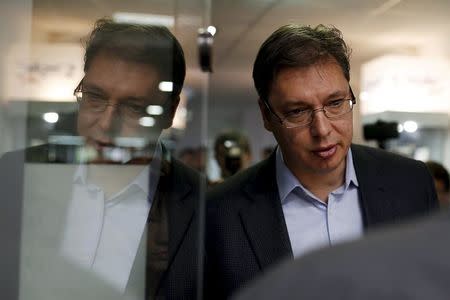Serbia's Vucic seeks mandate for EU talks in early election

By Ivana Sekularac and Aleksandar Vasovic BELGRADE (Reuters) - Serbian voters looked set to grant pro-western Prime Minister Aleksandar Vucic four more years in power on Sunday, but he will probably have to contend with a resurgent ultra-nationalist opposition demanding closer ties with Russia. Aiming to pursue a bid for European Union membership, Vucic called the parliamentary ballot just two years after he became prime minister following a landslide election win for his conservative Progressive Party. Vucic, a 46-year-old former hardline nationalist, has promised a new drive to privatise loss-making state-run companies if he is re-elected, and pollsters expected him to win another absolute majority. But Serbia's political picture is likely to be complicated by the re-emergence of Vojislav Seselj's anti-EU Radicals, which austerity-weary voters were tipped to return to parliament for the first time since 2012 as the third largest party. Seselj, a nationalist firebrand, could become de facto leader of the opposition, less than a month after the U.N. tribunal in The Hague acquitted him of war crimes during the 1990s breakup of Yugoslavia. Vucic, casting his vote in a drab Belgrade suburb of post-war, socialist housing blocks, said he believed Serbs would "choose the future. "We will continue our European path, fully respecting our ties with traditional allies in the East such as China and Russia," he said. Seselj said that if the Radicals won, "we will go into coalition with those parties who want to give up European Union accession to start integration with Russia." Voter turnout was steady despite rainy weather. Srdjan Zivkovic, a software engineer who arrived early at a Belgrade polling station, declined to say how he would vote but said he expected Vucic's party to lose some of its power. "It is not good to have one party with absolute power as is the case here now. They (the ruling party) are pressuring media, and their fight against corruption is just a charade," he said. Critics say the behaviour of Vucic's government has grown increasingly authoritarian. ULTRA-NATIONALIST RESURGENCE Analysts think Vucic - information minister in the last years of late President Slobodan Milosevic's rule - will continue to govern in coalition with the second-biggest party, the Socialists, though he does not need to, to broaden his base. Vucic says he wants a clear mandate from Serbia's seven million people for reforms to keep EU membership talks launched in December on track for completion by 2019. But the hitherto broad consensus in parliament in favour of EU membership will be broken if Seselj's ultra-nationalists, and a second right-wing grouping, win seats as expected. Their rise reflects discontent with the tight-money policies Vucic has been forced to follow as the price of a 1.2 billion euro ($1.35 billion) International Monetary Fund loan agreement. Cuts in public spending and subsidies, and tax rises, helped Serbia trim its budget deficit by nearly half last year. But the economy is recovering only slowly from recession and unemployment is around 18 percent. Polls close at 8 p.m. (1800 GMT) with first unofficial exit polls expected about an hour later. ($1 = 0.8909 euros) (Editing by Mark Heinrich)

